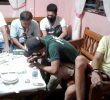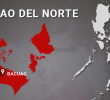DAVAO CITY, Philippines – Countless in the country heaved a sigh of relief after the Office of the Prosecutor (OTP) of the International Criminal Court (ICC) Fatou Bensouda’s request on June 14 for a judicial authorization to proceed with an investigation on President Rodrigo Roa Duterte’s ‘’war on drugs’’ that killed thousands since 2016.
House of Representatives Assistant Minority Leader and ACT Teachers Representative France Castro said Bensouda’s bold move before ending her term at the ICC was a step toward holding Duterte to account for his alleged crimes against humanity as Commander-in-Chief of his ‘’war on drugs.’’
The progressive lawmaker cited that the offenses against human rights in the context of war against drugs have reached the level of crimes against humanity, on par with those perpetrated by the most notorious dictators in history.
Rights group KARAPATAN said that despite the various efforts of government agencies to divert calls for an international investigation into the Philippines, Bensouda’s conclusions only makes clear that these killings “appear to have been committed pursuant to an official State policy of the Philippine government” along with “Philippine authorities’ failure to take meaningful steps to investigate or prosecute perpetrators” of the killings in the drug war — highlighting the sheer limitations and failure, if not virtual non-existence, of domestic and independent mechanisms of accountability.
Meanwhile, the Commission on Human Rights (CHR) urged the Philippine government to participate in this process of seeking truth and justice for the human rights violations committed in the country.
CHR spokesperson lawyer
“The Commission continues to view the decision of the Philippine National Police to open the cases of killings allegedly linked to the government’s drug campaign for the Department of Justice’s investigation as a step toward the right direction,” de Guia said.
However, presidential spokespe
“This is now a political issue. Hinding-hindi magko-cooperate ang Presidente hanggang tapos ng kaniyang termino sa June 30, 2022 (…The President will not cooperate until he ends his term on June 30, 2022),” said Roque.
In its weekly ‘’Talk to the People,’’ Duterte called on the Commission on Human Rights to take a second look on the war on drugs.
““Para ‘to sa mga tao na ayaw maniwala ng may namatay na mga tao in the prosecution of the drug war (This are for the persons who do not believe that there are people killed in the prosecution of the drug war),” Duterte said.
In a statement released on June 14, Bensouda declared that the preliminary examination had determined reasonable basis that the crime against humanity of murder has been committed on the territory of the Philippines between July 1, 2016 and March 16, 2019 in the context of the Government of the Philippines’ “war on drugs” campaign.
Bensouda said that the available information indicates that members of the Philippine National Police, and others acting in concert with them, have unlawfully killed between several thousand and tens of thousands of civilians during that time.
“My Office has also reviewed information related to allegations of torture and other inhumane acts, and related events as early as 1 November 2011, the beginning of the Court’s jurisdiction in the Philippines, all of which we believe require investigation,” she added.
She clarified that although the Philippines has withdrawn from the Rome Statute of the ICC on 17 March 2019, the Court retains jurisdiction over crimes that are alleged to have occurred on the territory of that State during the period when it was a State Party to the Rome Statute and that the crimes are not subject to any statute of limitation.
According to the Philippine Drug Enforcement Agency, 6,117 individuals were killed during police anti-drug operations from July 1, 2016, to April 30, 2021. The PNP has a higher figure – 7,884 killed from July 1, 2016, to August 1, 2020. The Office of the High Commissioner for Human Rights, in a report in June 2020, said these figures are conservative and that, based on government data, the number could be triple.










